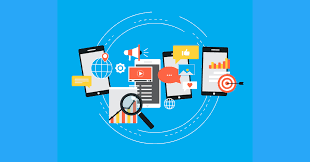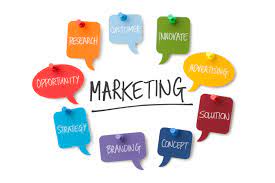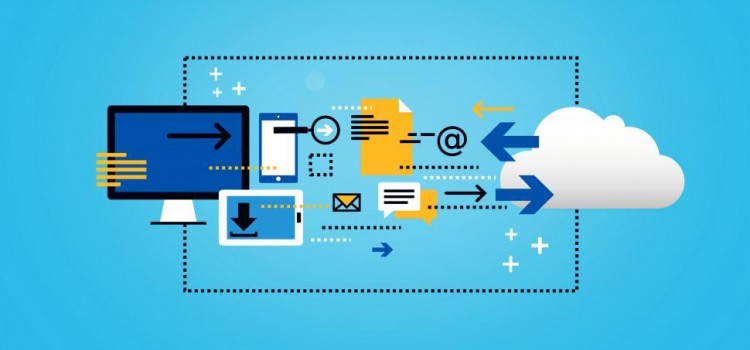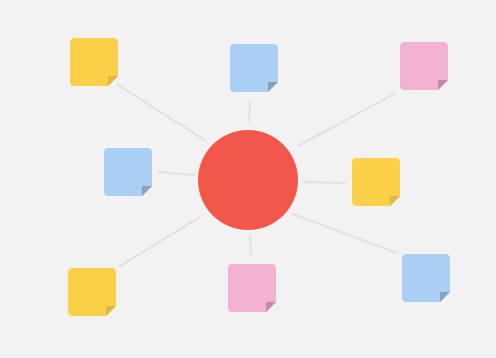Hello!
Currently, to carry out a more powerful content strategy, you need to have a roadmap. And in order not to get lost on this path, a Content Map or Content Mapping will help you to improve that task.
 This document collects and organizes the information that your buyer persona demands at each stage of their journey, and that you must know how to provide them. In this way, and thanks to this plan, you make sure that you will be able to deliver the answers that your potential client needs and at the right time.
This document collects and organizes the information that your buyer persona demands at each stage of their journey, and that you must know how to provide them. In this way, and thanks to this plan, you make sure that you will be able to deliver the answers that your potential client needs and at the right time.
Therefore, in the following lines I will explain what exactly a content map consists of, what are the key factors that make it up and how to make one. we start.
What is a content map?
A content map is a plan in which the content that will be shown to the buyer persona is strategically organized. This document specifies what type of consumer is being addressed, what interests them and at what point in the purchase cycle they are.
Therefore, working on a content map will make it easier for you to plan and develop your content strategy.
The idea is to be able to customize all the information according to the phase of the customer journey in which it is. In this way, the user is nurtured progressively: from the first moment (in which he expresses his concern) until conversion, closure and even loyalty.
What is a content map used for?
To better understand what a content map is, let’s see some of its utilities:
1. Improve Understanding of the Buyer Persona
 Before preparing your content map, you must already have your buyer or buyers persona well outlined.
Before preparing your content map, you must already have your buyer or buyers persona well outlined.
You need to know the concerns, interests, motivations and frustrations of your ideal client in order to satisfy their needs or solve their problems.
In this sense, an empathy map can help you to deepen your knowledge of your potential client even more.
2. Increases the Effectiveness of Strategies
With the content map you have a clearer idea of what you have to offer and how.
For example, the type of format (image, video or audio) most suitable for your Social Media strategy.
 In the same way, it helps you improve your SEO positioning strategy, since you take into account the search intention of your users. You understand the needs of your users, and therefore, it will be easier for you to find the keywords they use.
In the same way, it helps you improve your SEO positioning strategy, since you take into account the search intention of your users. You understand the needs of your users, and therefore, it will be easier for you to find the keywords they use.
Thanks to your strategically selected content, you will attract quality traffic to your website or blog.
On the other hand, by providing relevant content you gain authority, brand positioning and the approval of your audience. Perfect ingredients to boost your Inbound Marketing strategy.
3. Organize the Content
A content map allows you to visualize all the topics that you can deal with depending on the phase of your user’s funnel. It will be a great source of ideas, and it will help you detect possible gaps that you are not working on.
 In addition, you can easily visualize how to recycle your content, in order to get the most out of it.
In addition, you can easily visualize how to recycle your content, in order to get the most out of it.
Whether you already have content ready (published or to be published) or if you just want to know what information you should offer, having a map will allow you to organize it better.
The criteria used in the content maps (which we will see shortly) help you filter by relevance according to the level of the funnel in which the buyer person is located.
4. Stay in Control
The content map prevents the user from wandering, getting lost, and prevents you from meeting your goals. You can mark a path of “crumbs” that it must follow to advance naturally in the funnel.
5. Adequately impacts the target customer
Offering valuable content at the right time contributes to earning the trust of your users and placing you in their top of mind. So, when the time comes to make decisions, your brand is a candidate with a high probability of success.
Key factors of a content map
 A content map is made up of 3 main sections: the buyer persona, the content relevant to him and the life cycle.
A content map is made up of 3 main sections: the buyer persona, the content relevant to him and the life cycle.
Let’s see each one and the role it plays.
The Buyer Person
The buyer persona is a semi-fictitious definition of your ideal client, in which you must include all the information that allows you to know their needs and preferences regarding how to satisfy them.
With this you get to know how to prepare high intent content in order to be an option for him.
You do not have to create a buyer persona for each product or service that you offer, but it is valid that you create one for each type of user that you have when the differences are substantial. This way you will achieve an ideal adequacy of your contents.
Relevant Content
 All content has levels of complexity, and you must be able to offer all of them to meet the needs of your target audience.
All content has levels of complexity, and you must be able to offer all of them to meet the needs of your target audience.
The most important, perhaps, is the recruitment, which is the most basic information on the subject. However, don’t confuse “basic” with low quality. The latter must always be maintained.
Keep in mind that users are maturing in the life cycle, and their content needs are changing and becoming more demanding. This is where the following levels of information relevance come in. So if the user wants to move on because she liked what he found, he should be able to.
Lifecycle
The buyer persona life cycle is very similar to the sales funnel, and is made up of 3 phases very similar to TOFU, MOFU and BOFU.
Attraction and recognition (TOFU)
 These are the first searches that a user performs because they have discovered that they have a need.
These are the first searches that a user performs because they have discovered that they have a need.
As their level of knowledge is basic, the information is explained in a simple and entertaining way, prioritizing comfortable learning to gain their preference.
Consideration and Investigation (MOFU)
Having already mastered the basics, the user now wants to go deeper and get to know the subject better. Here you can optimize the format according to the user’s preferences, but always maintaining the same level of quality and simplicity when exposing the information.
At this point, it is ideal to request the data of your users, such as email, to continue feeding it with good content. This helps you measure the effectiveness of the plan.
Decision (BOFU)
In this final phase, the buyer person already knows what they need and how they can satisfy it, now they just want to find out what the best option is.
 That is why the content you offer is very important to achieve billing.
That is why the content you offer is very important to achieve billing.
The most common options are testimonials and FAQs, both of which are very effective in showing how good you are.
If you dress it with a good dose of social proof you will earn even more points.
How to create a content map in 5 steps?
You already know what a content map is and how beneficial it is for your content marketing strategy. What follows is knowing how to make one. You must do the following:
1º Create your buyer persona
We have previously discussed the role of this information within the content plan, therefore, you must pay a lot of attention and care to create an optimal profile of your ideal client.
Avoid assumptions by all means, rather base yourself on real research, true data that proves who your ideal client is and what they really need.
 The data you may collect includes:
The data you may collect includes:
- Work and income level.
- Personal values, such as aspirations, qualities, and beliefs.
- Lifestyle.
- Preferences in entertainment and information.
- Shopping habits.
You can add other data that you consider necessary in order to better profile your ideal client. Once you have the information, present it as a story, this will be like meeting someone real and it will be much easier to assimilate the data.
2º Understand the purchase cycle of your client
Each buyer persona has a different buying cycle, although it may share some similarities with others. In fact, in some cases the cycle is somewhat longer due to the nature of the ideal audience.
 For example, in addition to Discovery, Consideration and Decision, Engagement could be inserted, after the first point.
For example, in addition to Discovery, Consideration and Decision, Engagement could be inserted, after the first point.
This with the idea of beginning to create commitment in the user to enhance the other phases.
A Post Purchase phase may also be convenient, logically after the Decision. The objective is to maintain contact with the customer to build loyalty and motivate the next purchase.
Knowing the real purchase cycle of your buyer will allow you to work on it appropriately.
3º Analyze and select the content
The content must be appropriate for the time or place of the funnel in which your ideal client is. So, the appropriate thing is that you review what you have so far and organize it, perhaps by theme, so that it is easier for you to associate each phase with the most suitable content.
 Remember that one of the keys is knowing which format is ideal for each stage. For example:
Remember that one of the keys is knowing which format is ideal for each stage. For example:
- Discovery: buying guides, posting on social networks, infographics, videos…
- Consideration: reviews, case studies, eBooks, product landing pages…
- Decision: FAQ, sales landing page, registration page, free trials…
4º Design the content map template
Having collected all the necessary information, it remains only to embody the matrix. The easiest is to use a spreadsheet, so you can keep it as a template for the other maps. You could also use tools like Canva and Illustrator.
If it is your own project, the spreadsheet may suffice. But if it’s for a client, online design tools will help you create a more professional design. However, what you have to give priority to is the quality of the map in terms of information.
5º Time to create content and spread it
 Once you are clear about the different contents and formats, get down to work. And remember that the creation of the content is as important as its dynamization.
Once you are clear about the different contents and formats, get down to work. And remember that the creation of the content is as important as its dynamization.
Choose well the channels in which you are going to move, which are those in which your target audience is: in which social networks, email marketing, Ads, etc.
Also remember to adapt the format and content to the peculiarities of each medium.
Conclusion
Having a content map is very important so as not to blindly work on your content strategy.
 The effectiveness of the information increases if you use it at the appropriate time according to the progress of the buyer persona. Of course, for this you have to know your ideal client well, then you can show yourself as a solution.
The effectiveness of the information increases if you use it at the appropriate time according to the progress of the buyer persona. Of course, for this you have to know your ideal client well, then you can show yourself as a solution.
If your project or brand is small and does not have much experience in the market, using a content map will make it easier for you to bring them to your land.
Thank you!
Join us on social media!
See you!






